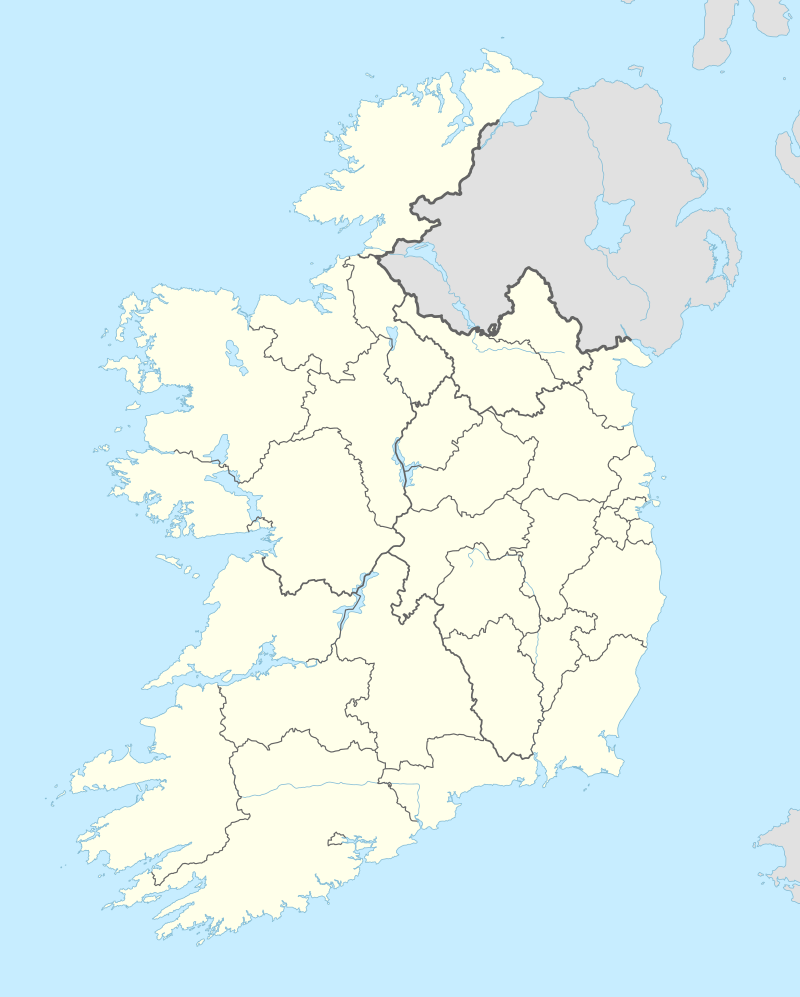Brosna, County Kerry
Brosna (Irish: Brosnach)[2] is a village and parish situated in the Sliabh Luachra area of County Kerry, Ireland. It lies 16 km (9.9 mi) from the town of Castleisland. The civil parish of Brosna consists of the village and a number of townlands.[3] It is a mainly agricultural area, supporting two churches, two schools, a post office, and five public houses.
Brosna Brosnach | |
|---|---|
Town | |
 Brosna Location in Ireland | |
| Coordinates: 52°18′43″N 9°16′01″W | |
| Country | Ireland |
| Province | Munster |
| County | County Kerry |
| Population (2016)[1] | 193 |
| Time zone | UTC+0 (WET) |
| • Summer (DST) | UTC-1 (IST (WEST)) |
| Irish Grid Reference | R746888 |
Geography
Brosna is a village in north east County Kerry. A number of Munster rivers have their sources in the parish, including the Clydagh, the Braonach, and the Munster Blackwater. The highest point is Mount Eagle. It is in the barony of Trughanacmy.[2] Crochaun Mountain is 1,400 feet (430 m) above sea level.
Brosna lies close to the Cork/Kerry and Kerry/Limerick borders, and neighbouring towns include Castleisland and Knocknagoshel in Kerry, Abbeyfeale and Mountcollins in Limerick, and Ballydesmond and Rockchapel in Cork.[4]
History
In Samuel Lewis's 1837 Topographical Dictionary of Ireland, Brosna was recorded as having 2168 inhabitants in 18,013 statute acres.[5] The same entry notes that a "large portion of the land consisted of coarse mountain pasture and bog, the greater part of which might be reclaimed".[5] As of the first half of the 19th century, there were 2 private schools in the area, in which approximately 120 children were educated.[5] Lewis also records that the Whiteboys (an agrarian organisation involved in "disturbances" in support of tenant farmer rights) were active in the area in the 1820s.[5]
The placename of Brosna or Brosnach may translate from the Irish for dried wood or fire wood.[6]
Church and well
A thatched church was built about 1800 in the grounds of the graveyard near the present church.[4]
The present church of "St Moling & St Carthage" was built in 1868 to designs by architect George Ashlin.[7] This church is in gothic revival style, and built with sandstone rubble walls and limestone ashlar dressings.[8] The church is dedicated to Saint Moling, and was reputedly built from stone quarried from the lands in Knopoge, with local farmers bringing the stone to the site by horse and cart.[4] Many of the stained glass windows were donated by parishioners. The design of the marble altar is attributed to Augustus Pugin.[4] The marble altar rails are newer, and were donated by Denis Guiney in 1946, in memory of his parents Cornelius and Julia Guiney.[4] Denis Guiney (1893-1967) was a native of Brosna, and had been a long-term operator of the Guineys and Clerys stores in Dublin.[9][10] The church's stone presbytery was also built in the late 1860s. The presbytery was restored in 1998, and a restoration on the church itself was completed in 2010.
Also close to Brosna, in the foothills of Sliabh Luachra, is a holy well associated with Saint Moling.[11] The well is reputedly close to the spot where Saint Moling (c.614–697) was born.[11] The well has been a place of pilgrimage over the years, with visits to the well traditionally occurring every Saturday in May.
References
- "Census 2016 Sapmap Area - Settlements - Brosna". census.cso.ie. Central Statistics Office. 2016. Retrieved 31 October 2018.
- "Brosnach / Brosna". logainm.ie. Irish Placenames Commission. Retrieved 31 October 2018.
- "Civil Parish of Brosna, County Kerry". townlands.ie. Townlands of Ireland. Retrieved 31 October 2018.
- "Welcome to Brosna". gokerry.ie. GoKerry Tourism. Retrieved 31 October 2018.
- Lewis, Samuel (1837). Topographical Dictionary of Ireland – via libraryireland.com.
- "Brosnach / Brosna (Civil Parish)". logainm.ie. Irish Placenames Commission. Retrieved 31 October 2018.
1841 [..] Brosnach, 'land of dried wood or fire wood' [..] OD:AL, Ci022,1
- "1869 – St Moling & St Carthage Church, Brosna, Co. Kerry". Archiseek.com. Archiseek. 2014. Retrieved 31 October 2018.
- "Saint Moling's Catholic Church, Brosna, County Kerry". buildingsofireland.ie. National Inventory of Architectural Heritage. Retrieved 31 October 2018.
- "City changed utterly by decline and sudden fall of an iconic department store". independent.ie. Independent News & Media. 27 December 2015. Retrieved 31 October 2018.
Denis Guiney, originally from Brosna, Co Kerry, became the most successful retailer in the city and ran Clerys until his death in 1967
- "So exactly which Guineys is closing down?". thejournal.ie. The Journal. 18 September 2012. Retrieved 31 October 2018.
Guineys & Co at 79-80 Talbot Street, which was the sister shop to Clerys on nearby O’Connell Street [..] was set up by Kerry businessman Denis Guiney, who bought Clerys in 1941
- "St Moling's Holy Well". gokerry.ie. GoKerry Tourism. Retrieved 31 October 2018.